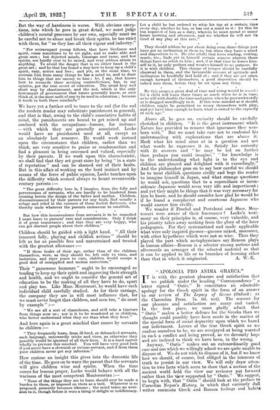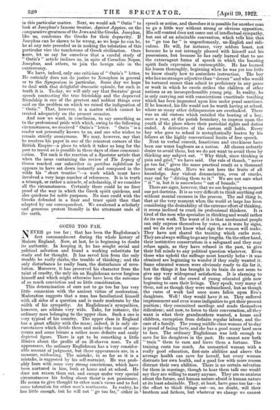" APOLOGIA PRO ANIMA GRAECA."
IT is with the greatest pleasure and satisfaction that we publish under the heading " Correspondence " a letter signed " Outis." It constitutes an admirable apology for the Greek spirit in the form of an answer to our review of The Legacy of Greece (Oxford : at the Clarendon Press. 7s. Gd. net). The reasons for our pleasure and satisfaction are many and varied. In the first place, we most gladly admit that " Outis " makes a better defence for the Greeks than we thought could possibly have been made in the matter of the special form of social depravity upon which we based our indictment. Lovers of the true Greek spirit as we confess ourselves to be, we are overjoyed at being worsted in such a conflict and being proved, as we devoutly hope and are inclined to think we have been, in the wrong.
Anyway, " Outis " makes out an extraordinarily good case and one which we willingly admit we are quite unable to dispose of. We do not wish to dispose of it, but if we knew how we should, of course, feel obliged in the interests of truth to persist in our view. We will only draw atten- tion to two facts which seem to show that a section of the ancient world held the view our reviewer put forward rather than the view supported by " Outis." We suggest, to begin with, that " Outis " should look at the preface to Cornelius Nepos's History, in which that curiously dull writer contrasts Greek and Roman feelings and habits in this particular matter. Next, we would ask " Outis " to look at Josephus's famous treatise, Against Appian, on the comparative greatness of the Jews and the Greeks. Josephus, like us, condemns the Greeks for their depravity. If Josephus .can be shown to be wrong, as we hope he can be, he at any rate preceded us in making the toleration of this particular vice the touchstone of Greek civilization. Once more, let us say for ourselves that a careful study of " Outis's " article inclines us, in spite of Cornelius Nepos, Josephus, and others, to join the benign side in the controversy. We have, indeed, only one criticism of " Outis's " letter. He certainly does not do justice to Xenophon in general or to the Symposium in particular. Some day we hope to deal with that delightful- dramatic episode, -for such in truth it is. To-day, we will only say that Socrates' great speech contrasting the true friendship and the depraved friendship is one of the greatest and noblest things ever said on the problem on which we raised the indignation of " Outis." That, however, is a matter which cannot be treated adequately on the present occasion.
And now we want, in conclusion, to say something as to the professional pride with which, owing to the following circurastances, we received " Outis's " letter. " Outis " is a reader not personally known to us, and one who wishes to remain strictly anonymous. We may, however, say that he receives his paper in one of the remotest corners of the British Empire—a place to which it takes as long for the post to travel as is possible in these days of close communi- cation. Yet such is the reaction of a Spectator article that when the issue containing the review of The LPgacy of Greece reached our subscriber in partilyus infidelium he appears to have sat down instantly and composed in the wilds his " short treatise "—a work which must have involved a very large number of references. It is in truth a triumph, or rather a miracle, of scholarship, if we consider all the circumstances. Certainly there could be no finer proof of the way in which the Greek spirit quickens, and also quickens for noble purposes. No man could wish the Greeks defended in a- finer and truer spirit than that adopted by our correspondent. We awakened a scholarly and generous protest literally in the uttermost ends of the earth.



































 Previous page
Previous page